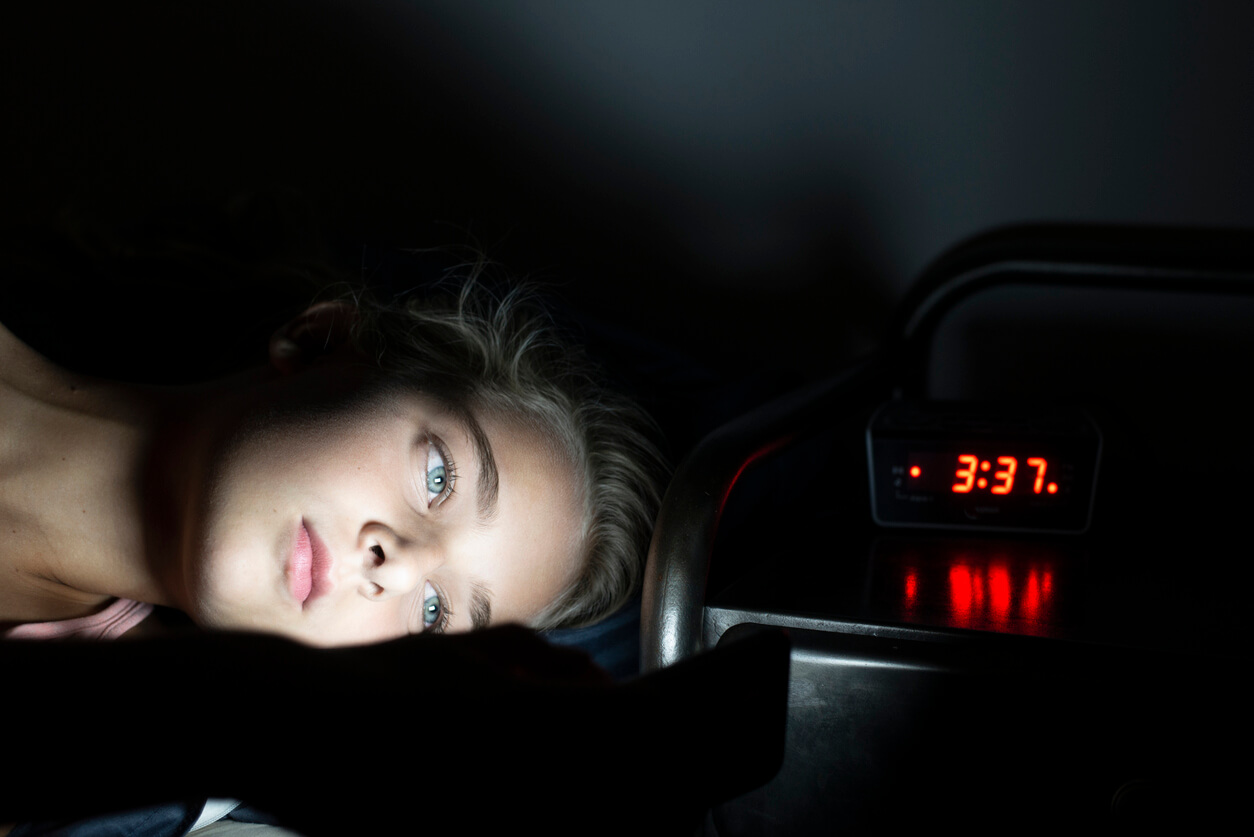6 Consequences of Sleep Deprivation in Adolescents


Written and verified by the psychologist Mara Amor López
Sleeping the corresponding hours is a fundamental aspect of people’s health. Often, we don’t give it the importance it deserves, but we must know that sleep deprivation in adolescents can have negative consequences on their development. That’s why we must change our outlook and instill good sleep hygiene habits from the time our children are young.
Humans spend a large part of our lives sleeping, and although for young people this may seem like a waste of time, it’s not at all. During sleep, the body performs essential tasks for our physical and mental well-being. In addition, it repairs what has been damaged and prepares us to face a new day.
Do you want to know in detail what happens when our night’s rest is insufficient in quality and quantity? We’ll tell you about it below.
Some causes of sleep deprivation in adolescents
In many cases, sleep deprivation is due to an insufficient amount of hours of rest.
This can happen because we don0t consider sleep as a healthy lifestyle habit, as we do with food and sports. Therefore, much of the rest routines that children and adolescents maintain depend more on the environment than on their biological condition.
Another possible cause of sleep deprivation in adolescents may be due to the psychological, physical, social, and emotional changes children experience during this stage of life, which have an impact on the rest pattern. Therefore, it’s common for them to go to bed later than when they were children although they still need a minimum number of hours of sleep for their proper development.
The use of electronic devices such as cell phones, computers, tablets, or televisions in their bedrooms also hinders the early onset of sleep, as the blue light “makes the brain believe” that it’s daytime.

The consequences of lack of sleep in adolescents
Lack of sleep in adolescents can have negative consequences on their psychological, cognitive, physical, social, and emotional health. Therefore, it can affect their present and future life. Here are some of the issues resulting from poor sleep.
1. It limits their cognitive capacity
Lack of sleep in adolescents can alter their ability to learn, cause memory problems, and decrease their attention during the day. In the long run, it often causes problems in their academic performance.
2. Increases the risk of mental illness
Poor quality or quantity of sleep can lead to different mental, physical, and behavioral problems. In addition, once a child’s mental health is affected, a vicious circle begins: Mental problems interfere with sleep and in turn, sleep worsens physical, and emotional discomfort. Some of the disorders associated with this lack of sleep are the following:
- Anxiety
- Depression
- Stress
- Loss of impulse control
- Behavioral problems
3. Decreases physical performance
While we sleep, the body puts into operation different processes to repair and regenerate brain tissues and the rest of the body. Also, we recover the energy consumed to function efficiently the next day. Thus, sleep is an important aspect for our physical and psychological well-being and it’s important to sleep the necessary time to perform adequately during the day.
4. Predisposes teens to poor nutrition
Sleep deprivation in adolescents makes them eat worse and eat more unhealthy foods.
In addition, nighttime sleep deprivation increases the risk of developing obesity and diabetes, as it increases appetite and insulin resistance. Therefore, getting a good night’s sleep is essential for proper metabolic regulation.
5. Promotes low mood
When an adolescent doesn’t get enough sleep, their mood can be altered and make them feel emotionally unstable.
Lack of sleep can cause changes in the attitudes of young people, making them more irritable and unable to deal with everyday problems in a healthier and more effective way.

6. Increases the risk of developing addictions
Emotional problems derived from sleep deprivation make young people more vulnerable to developing addictions, as these behaviors help them to “relieve” discomfort instantly. But, in the long run, they increase it and worsen the quality of life in all aspects.
Some final considerations about lack of sleep in adolescents
Ultimately, lack of sleep in adolescents has a negative impact on health, both present, and future. It’s important to understand that sleep, like exercise and diet, is an essential aspect of maintaining good health.
As parents, it’s in our hands to educate our children to incorporate good sleep habits and make them understand the importance of sleeping well, in quality and quantity. This way, they’ll achieve adequate mental and physical development.
Sleeping the corresponding hours is a fundamental aspect of people’s health. Often, we don’t give it the importance it deserves, but we must know that sleep deprivation in adolescents can have negative consequences on their development. That’s why we must change our outlook and instill good sleep hygiene habits from the time our children are young.
Humans spend a large part of our lives sleeping, and although for young people this may seem like a waste of time, it’s not at all. During sleep, the body performs essential tasks for our physical and mental well-being. In addition, it repairs what has been damaged and prepares us to face a new day.
Do you want to know in detail what happens when our night’s rest is insufficient in quality and quantity? We’ll tell you about it below.
Some causes of sleep deprivation in adolescents
In many cases, sleep deprivation is due to an insufficient amount of hours of rest.
This can happen because we don0t consider sleep as a healthy lifestyle habit, as we do with food and sports. Therefore, much of the rest routines that children and adolescents maintain depend more on the environment than on their biological condition.
Another possible cause of sleep deprivation in adolescents may be due to the psychological, physical, social, and emotional changes children experience during this stage of life, which have an impact on the rest pattern. Therefore, it’s common for them to go to bed later than when they were children although they still need a minimum number of hours of sleep for their proper development.
The use of electronic devices such as cell phones, computers, tablets, or televisions in their bedrooms also hinders the early onset of sleep, as the blue light “makes the brain believe” that it’s daytime.

The consequences of lack of sleep in adolescents
Lack of sleep in adolescents can have negative consequences on their psychological, cognitive, physical, social, and emotional health. Therefore, it can affect their present and future life. Here are some of the issues resulting from poor sleep.
1. It limits their cognitive capacity
Lack of sleep in adolescents can alter their ability to learn, cause memory problems, and decrease their attention during the day. In the long run, it often causes problems in their academic performance.
2. Increases the risk of mental illness
Poor quality or quantity of sleep can lead to different mental, physical, and behavioral problems. In addition, once a child’s mental health is affected, a vicious circle begins: Mental problems interfere with sleep and in turn, sleep worsens physical, and emotional discomfort. Some of the disorders associated with this lack of sleep are the following:
- Anxiety
- Depression
- Stress
- Loss of impulse control
- Behavioral problems
3. Decreases physical performance
While we sleep, the body puts into operation different processes to repair and regenerate brain tissues and the rest of the body. Also, we recover the energy consumed to function efficiently the next day. Thus, sleep is an important aspect for our physical and psychological well-being and it’s important to sleep the necessary time to perform adequately during the day.
4. Predisposes teens to poor nutrition
Sleep deprivation in adolescents makes them eat worse and eat more unhealthy foods.
In addition, nighttime sleep deprivation increases the risk of developing obesity and diabetes, as it increases appetite and insulin resistance. Therefore, getting a good night’s sleep is essential for proper metabolic regulation.
5. Promotes low mood
When an adolescent doesn’t get enough sleep, their mood can be altered and make them feel emotionally unstable.
Lack of sleep can cause changes in the attitudes of young people, making them more irritable and unable to deal with everyday problems in a healthier and more effective way.

6. Increases the risk of developing addictions
Emotional problems derived from sleep deprivation make young people more vulnerable to developing addictions, as these behaviors help them to “relieve” discomfort instantly. But, in the long run, they increase it and worsen the quality of life in all aspects.
Some final considerations about lack of sleep in adolescents
Ultimately, lack of sleep in adolescents has a negative impact on health, both present, and future. It’s important to understand that sleep, like exercise and diet, is an essential aspect of maintaining good health.
As parents, it’s in our hands to educate our children to incorporate good sleep habits and make them understand the importance of sleeping well, in quality and quantity. This way, they’ll achieve adequate mental and physical development.
All cited sources were thoroughly reviewed by our team to ensure their quality, reliability, currency, and validity. The bibliography of this article was considered reliable and of academic or scientific accuracy.
- Casanueva García de Alvear, M. A. (2016). Alteraciones del sueño, obesidad y resistencia a la insulina. En internet: https://repositorio.unican.es/xmlui/handle/10902/9117
- Solari, B. F. (2015). Trastornos del sueño en la adolescencia. Revista Médica Clínica Las Condes, 26(1), 60-65. En internet: https://www.sciencedirect.com/science/article/pii/S0716864015000103
- García-Ward, A. S., Gómez-Ochoa, M. Á., Manjarrez-López, M. D. C., & Mazatlán, A. S. E. S. La importancia del sueño en el rendimiento escolar de los adolescentes. Puerto del Conocimiento, 149. En internet: https://www.researchgate.net/profile/Angeles-Tangoa-Villacorta/publication/344273228_p220-puerto-del-conocimiento–_1_y_2_de_primaria_en_comunidades_Nahualtl-Hablantes_de_la_Huasteca_Potosina_219/links/5f627d3592851c07896d7c55/p220-puerto-del-conocimiento–1-y-2-de-primaria-en-comunidades-Nahualtl-Hablantes-de-la-Huasteca-Potosina-219.pdf#page=150
This text is provided for informational purposes only and does not replace consultation with a professional. If in doubt, consult your specialist.








